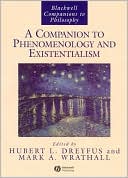

 |

|

The average rating for A Companion to Phenomenology and Existentialism based on 2 reviews is 4 stars.
Review # 1 was written on 2017-07-17 00:00:00 Richelle Dumfrey Richelle DumfreyReading some texts on Phenomenology for the past few years, had me appreciate the diversity of this school of thought in philosophy. This book is a collection of essays expounding on the origins, ramifications and means through which phenomenology, and eventually existentialism diverge. In a short span of time, I might not be able to process all the thoughts contained in this volume, but it is highly recommended for those interested in exploring the historical context, significance and current implications of both phenomenology and existentialism. |
Review # 2 was written on 2017-08-01 00:00:00 Stephen Alexander Stephen AlexanderThis is a collection of critical essays engaging either with schools of existentialism in history of philosophy or with its significance for philosophical research nowadays. Concerning the latter, however, the focus is put on issues that are interesting from an analytical perspective, such as neuroscience (chapter 23), Artificial Intelligence (chapter 26), naturalism (chapter 29), or mathematics (chapter 39). This indicates that the book is originally intended to be a "companion" to analytical philosophers who wants to approach phenomenology due to reasons intrinsic or extrinsic to his or her own research. In other words, phenomenology and existentialism are considered "supplements" to a ready-made framework. That being said, the articles that appear in this volume still differ in terms of the extent to which they conform to that framework and, due to its stipulation on the theoretical horizon, squeeze materials into it. For example, Udo Tietz's account of German Existenzphilosophie is at most mediocre. Not only does he spend too little length on Karl Jaspers, the major proponent of existentialism in Germany; his account of Martin Heidegger also totally misses the point. Instead of presenting Heidegger's ideas as faithfully as possible (which is expected in such a book), Tietz carries out a lengthy, ambiguous and frequently digressing critique on Heidegger's notion of Jemeinigkeit, arguing that it fails to accommodate human sociability. The critique follows the lines of K.O. Apel, who insists on a naïve conception of "an intersubjectively shared lifeworld" and covers it up with linguistics. In Tietz's eyes, Heidegger's authentic Dasein, who has already undergone individuation, can no longer return to that intersubjective world. But this simply ignores the fact that, for Heidegger, authenticity is but an ideal that Dasein can never actually arrive at. Accordingly, there is no problem of getting back to being-with-others - Dasein is never apart from it. Moreover, what Tietz proposes instead is a leveled mode of being-with, the only thing that makes a post-war German academic morally comfortable. If Tietz's article can be accused of partiality and lack of coherence, Frederick Olafson's article on "Freedom and Responsibility" is a joke. The author bears in mind a narrow sense of freedom and responsibility in advance, and then sets out to see if anything in existential literature gets close to it. Actually he could well present his own understanding independently instead of enforcing it by misinterpreting philosophers (his reading of Husserl, for example, totally ignores the sense of responsibility in Crisis of European Sciences and Transcendental Phenomenology ). He does not do so, perhaps because he feels comfortable lurking behind the big figures and poking at their backs. Both Tietz and Olafson propose a view of human community that is popular in the present age but fails to respond to the thrust of phenomenology and especially existentialism. In it the vanity of mass society continues to strengthen itself and to exercise values of the coward who is incapable of any serious anguish. Some chapters (e.g. 11, 13, 15, 33), although exhibiting a lack of through understanding of the material, nevertheless fulfills their role as an introduction, for the authors try to recognize problems that are inherent to the material. Some others (14, 17, 35, 36) show precise understanding and rigorous engagement. Robert Wicks links the core concepts of French existentialism to its historical roots. Piotr Hoffman and Julian Young are very acute in finding the hidden discrepancies in Sartre and Camus, elevating the reader's understanding of them above textbook knowledge. Michael Gillespie presents an interesting and highly original claim that phenomenology and existentialism embody a desire for direct access to the absolute. I would recommend this book to anyone who has a general interest in phenomenology or existentialism and wants to go a bit further than introductory course level. For continental philosophers who are already familiar with the figures and are looking for interesting comments and insights, I would say that there is chance, but patience is a must. |
CAN'T FIND WHAT YOU'RE LOOKING FOR? CLICK HERE!!!